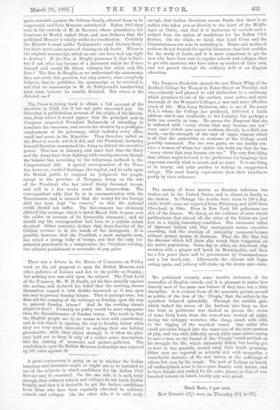The Times is trying bard to obtain a full account
of the situation in Chili, but it has not quite succeeded yet. On Saturday, it published an account of the origin of the Revolu- tion, from which it would appear that the principal men in Congress suspected President Balmaceda of intending to nominate his successor, and secure his election by a profligate employment of his patronage, which includes every office, small and great, in the Republic. They therefore called on the Fleet to revolt, which it did, and the President, declaring himself Dictator, summoned the Army to defend the executive power. This was in January, and since that time the Navy and the Army have been fighting with varying success, though the balance has, according to the telegrams, inclined to the Congressional side. A special correspondent of the Times has, however, reached Santiago, the capital, and he calls upon the British public to suspend its judgment, the people, except in the province of Tarapaca, being on the side of the President, who has raised thirty thousand troops, and will in a few weeks crush the insurrection. The correspondent adds that he is in communication with the Government, and is assured that the money for the foreign debt has been kept "in reserve," so that the national credit should not suffer. The Government has obviously allowed this message, which is dated March 19th, to pass over the cables on account of its favourable character ; and we should say the correspondent had been to a certain extent .deceived. Other accounts declare that three-fourths of the sChilian revenue is in the hands of the insurgents. It is .possible, however, that the President, a most energetic man, has raised a strong body of troops, and that the only ter- mination practicable is a compromise, the President retiring, but without punishment or surrender of any gains.


































 Previous page
Previous page